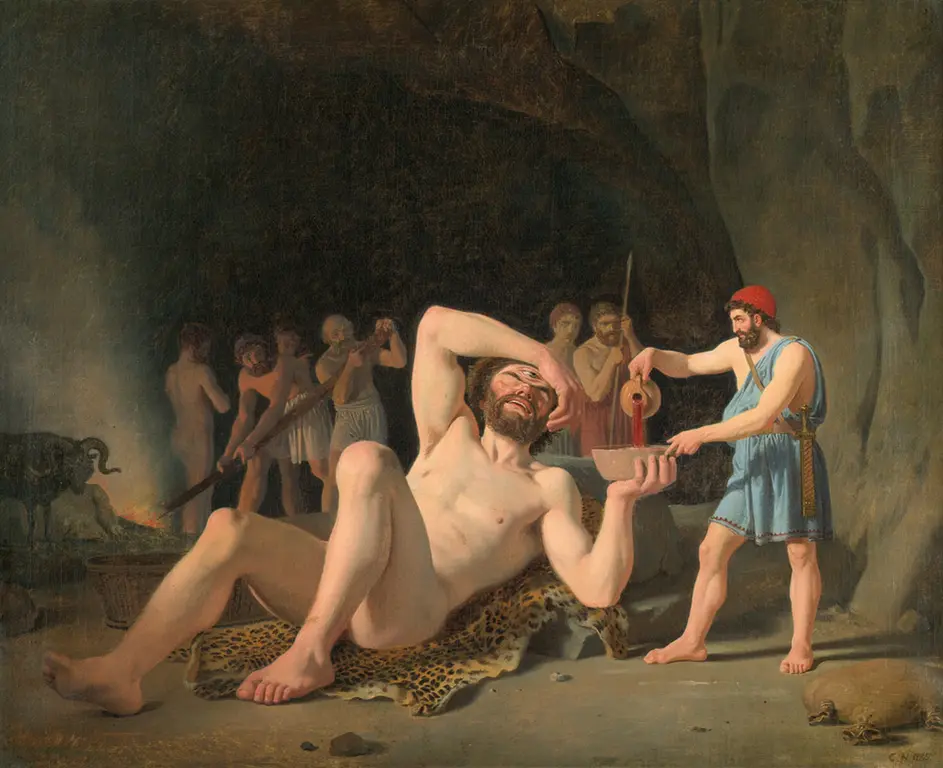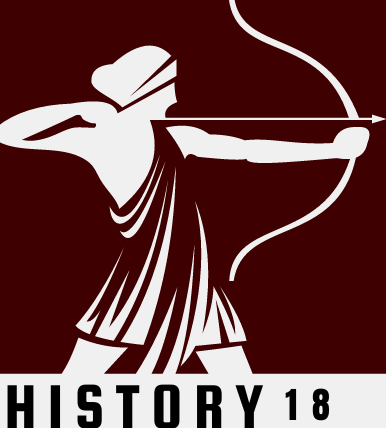The tale of Odysseus and the Cyclops is a renowned Greek myth recounted by Homer in the Odyssey. It centers on the savage one-eyed giant Cyclops who posed a dire threat to the hero Odysseus, nearly bringing his journey to an abrupt end.
The Characters

Odysseus: Within the realms of Greek and Roman mythology, Odysseus, recognized as Ulysses in its Latin rendition, emerges as a fabled monarch ruling over Ithaca. He stands as the central figure in Homer’s revered epic narrative, the Odyssey, which traces his intricate voyages and trials. Notably, Odysseus assumes a pivotal mantle in Homer’s Iliad and various other literary creations, further solidifying his indelible presence within these mythic sagas.
Polyphemus: The one-eyed giant from Greek mythology, Polyphemus is the son of Poseidon and Thoosa. He belongs to the Cyclopes, a group described in Homer’s Odyssey. During the time of the Trojan War, Cyclopes were considered mythological creatures residing on the Island of the Cyclopes, often associated with Sicily. These Cyclopes were primarily herdsmen, tending to their flocks rather than engaging in farming.
Odysseus’s Return From Troy
This protracted Trojan War spanned nine years, pitching the Greeks against the city of Troy situated on the western shores of present-day Turkey. Ultimately, the Greeks emerged victorious, although the triumph came at a cost, with many lives lost.
During Odysseus’s voyage back to Ithaca, his crew faced challenges, veering off course and landing on a small forested island. Seeking sustenance, they spied a larger neighboring island resonating with goat cries.
Encouraged by this, Odysseus organized a scouting party and set off for the distant shore. Discovering a vast goat enclosure near a cave, they encountered an abundance of cheese and meat. As they relaxed in satiated comfort, the shepherd returned.
Polyphemus – The Cyclops Arrives
The sight of him immediately captured the Greeks’ complete attention. He stood as colossal as a barn, featuring a solitary, piercing eye positioned in the middle of his forehead. He was a member of the Cyclopes, formidable blacksmiths responsible for crafting Olympus, the abode of the gods.
This specific Cyclops bore the name Polyphemus. He and his fellow Cyclopes lived solitary lives alongside their herds. While the Greeks were taken aback, Polyphemus was pleasantly surprised, for before him, by his own hearth, lay a culinary delight that could diversify his diet.
Ensuring a massive boulder blocked the cave entrance, a stone so immense even a full crew of heroes couldn’t budge it, he swiftly seized two of Odysseus’s men, mercilessly ending their lives and devouring them. Satiated, he nestled in a corner and drifted into slumber with a belch.
Odysseus was naturally consumed by concern, wondering what peril he had led his men into. Helplessly, they endured the night in terror due to the obstructed exit. With dawn, the Cyclops pushed aside the mammoth stone, rallied his goats, released them to pasture or yard, and then resealed the entrance. The following night brought more Greeks to his dinner table.
Odysseus And The Greeks Plan Their Escape
Driven to desperation, Odysseus formulated a strategy. He initiated by presenting the Cyclops with wine. This was no ordinary wine – it was an extraordinarily potent concoction, brought ashore by him and his crew in leather containers. The Greeks typically diluted their wine with water to moderate its intensity. However, the Cyclops, unaccustomed to the beverage, consumed it undiluted, causing an immediate inebriation.
Conversation between Odysseus and Cyclops
Before he conked out, he asked Odysseus his name. “Nobody,” replied the hero. “Well, Mr. Nobody, I like you,” said the Cyclops drowsily. “In fact, I like you so much that I’m going to do you a favor. I’ll eat you last.”
Uplifted by these reassuring words, he sank into a deep slumber. Swiftly, Odysseus sprang into action, rallying his men. They crafted a sharp-tipped pole, hardening it in flames. Then, with a resounding effort, they thrust it into the Cyclops’ eye.
Polyphemus writhed in torment, groping blindly for his assailants, while the Greeks deftly evaded him throughout the night. At one point, he cried out, summoning fellow Cyclopes. “What’s wrong?” they called from the cave entrance. “Blinded and anguished!” bellowed Polyphemus.
“Whose doing is this?” they inquired.
“Nobody’s,” replied Polyphemus.
“Then you must be troubling us for no reason,” retorted the Cyclopes as they left. Morning arrived, and Polyphemus gathered his flock, rolling the boulder away to set them free. He stationed himself at the entrance to block the Greeks’ escape. Whispering at length to a ram, he sought empathy for his ordeal.
“Remember,” he advised the creature, “never trust Greeks.” With those words, he stroked the wooly back of the ram and sent it from the cave.
Odysseus And The Greeks Escape
Unbeknownst to Polyphemus, Odysseus himself clung tenaciously to the ram’s underside. Likewise, his companions had concealed themselves amidst the rest of the flock. As Polyphemus grasped the trick, he dashed to the coastline, where Odysseus and his crew were rowing furiously toward safety.
The hero couldn’t resist a taunt. “For the record, I am Odysseus,” he shouted over the waves. “Yet, for your woes, Nobody deserves your gratitude—nobody but yourself, that is.”
Infuriated, Polyphemus hurled a massive rock that nearly capsized the ship. However, the rowers redoubled their efforts, leaving the blinded Cyclops raging on the shore.
Cyclops Asks Poseidon To Interfere With Odysseus’s Journey Home
Following their escape, Odysseus commits a grave error by mocking the Cyclops. Enraged, the Cyclops then appeals to his father, Poseidon, entreating, “Hear me, Poseidon… make sure Odysseus never reaches home. But if fate permits his return, may it be a tardy, woeful journey, with his comrades lost and arriving in a foreign ship, finding troubles in his own dwelling.”
Odysseus’ taunts jeopardize not only his crew but also the speediness of their homeward voyage. Repeatedly opting to taunt rather than heed his crew’s counsel underscores his hubris. This arrogance ultimately precipitates a fateful downfall.
Polyphemus’ plea to Poseidon is eventually answered, actualized as Poseidon conjures storms at sea that prolong his journey to Ithaca to ten whole years, with seven of those spent with Calypso.
Summary
The myth of Odysseus and the Cyclops, narrated in Homer’s Odyssey, recounts the encounter between the hero Odysseus and the one-eyed giant Cyclops. After the Trojan War, Odysseus and his crew found themselves on an island.
Exploring, they stumbled upon the Cyclops Polyphemus’ cave. Trapped inside, Odysseus devised a cunning plan. He offered the Cyclops wine, intoxicating him. When asked his name, Odysseus cleverly replied “Nobody”. While Polyphemus slept, Odysseus and his men sharpened a stake and blinded the giant.
Escaping under the sheep, they taunted Polyphemus, revealing Odysseus’ true identity. Furious, Polyphemus hurled a boulder at the ship. The tale illustrates Odysseus’ wit and resourcefulness, showcasing his ability to overcome seemingly insurmountable challenges.
